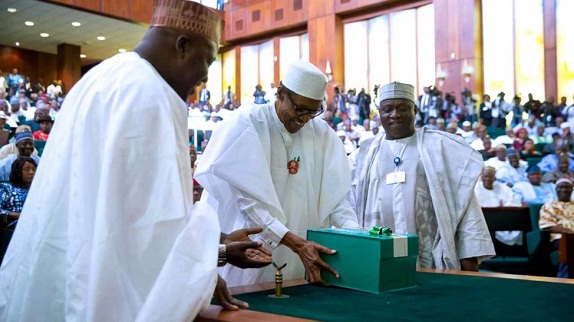Despite the establishment of an efficiency unit in the Ministry of Finance, mandated to vet the financial operations of government with a view to reducing cost, there is 14.2 per cent increase in recurrent expenditure to N2.98 trillion for 2017.
 President Muhammadu Buhari
President Muhammadu Buhari
Except for change in size, the 2016 budget and the proposed 2017 fiscal plan have followed the usual incremental path in recurrent expenditure.
Specifically, in the 2013 budget, the recurrent expenditure moved from N2.4 trillion to N2.45 trillion in 2014; N2.59 trillion in 2015; and N2.61 trillion in 2016, the first fiscal plan of the current administration.The National President, Association of Small Business Owners of Nigeria, Dr. Femi Egbesola says that while the current government is more transparent than others in terms of fiscal matters, managing an economy is more than ensuring that leakages are reduced.
“I believe the round pegs are yet to be in the round holes. We still have a dearth of the right economic team as handlers of our fiscal policies and the economy at large. We need not only engage experts, but also bring on board various stakeholders.
“What the common man on the street wants is to have the right economic climate that will not only put food on their table today, but also ensure that they get the same tomorrow without much ado.
“I look forward to seeing a government that will not only prepare and get budgets approved, but the one that ensures that such budgets have 100 per cent success rate in implementation,” he said.
A fiscal governance campaigner and lead director of the Centre for Social Justice (CSJ), Eze Onyekpere, noted that these increments “cannot be the sign of a system that is taking steps to remove waste and inefficiencies.”
While the recurrent expenditure gets more allocation, the administration has failed, for the second consecutive year, to meet international standards in education and health, which it ratified–the 26 per cent UNESCO benchmark and the 15 per cent Abuja Declaration.
“The poor allocation to education and health care cannot be justified in the light of critical challenges in the two sectors. The National Assembly is expected to review the budget of the two sectors to increase the allocations. It is also not clear whether the Basic Healthcare Provision Fund is part of the allocation in Statutory Transfers,” he said.
Of concern too is the observed lopsidedness of allocations in the two ministries in favour of recurrent expenditure, as out of N448 billion for the Ministry of Education, only N50 billion was voted for capital projects. The Ministry of Health allocated only N51 billion for capital projects, out of the N304 billion for the sector.
The implications are that basic provisions will remain elusive as usual in both sectors, while poor quality of education, high medical tourism and infrastructure challenges are indirectly promoted.Experts have noted that the level of shortfalls in 2017 might lead to further debt deals that will result in adjusted debt service bill.
Government’s yearly budget deficits were on the paths of decline until 2014, when they rebounded. It was N852 billion in 2011; N744 billion in 2012; N577 billion in 2013; N1.1 trillion in 2014; N2.2 trillion in 2015; and N2.3 trillion in 2017.
The Chief Executive Officer of Cowry Assets Management Limited, Johnson Chukwu said: “This is a very optimistic budget. But to me, it would be an exceptional occurrence if we meet the volume of production. This is because even if you stop the crisis in the Niger Delta, you are still going to take some time to restore those oil facilities to their production levels.”
The Chief Consultant at Biodun Adedipe Associate Limited, Dr. Biodun Adedipe, while describing the proposed budget as a “good direction”, said the important thing was to encourage the government to continue in that direction in terms of sector focus and emphasis on capital expenditure.
For Afrinvest Securities Limited, the challenge remains ample implementation of the projected expenditure as actual capital expenditure in 2016 as at September was not a radical performance needed, especially given the budget’s timeframe.
“Despite the optimistic projected revenue in 2017, we are cautioned by the fact that actual government revenues have remained pressured and performance rate would be less than desired.
“We expect fiscal deficit will expand above 2.2 per cent of GDP in the proposed budget to be financed exclusively with domestic borrowing at the expense of tighter monetary policy and crowding-out of the private sector,” the company said in a note to The Guardian.







